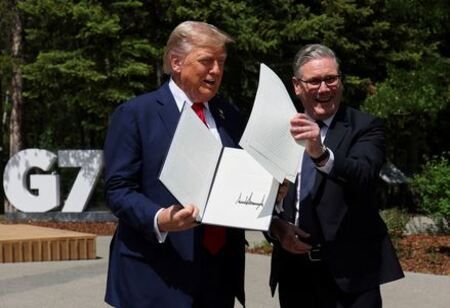
Trump, Starmer Agree to Implement Tariff-Cutting Trade Deal


US President Donald Trump and Prime Minister Keir Starmer agreed to enact commercial agreements revealed last month that would increase UK limits on specific American agricultural items and reduce US tariffs on important British exports.
At the Group of Seven conference in Kananaskis, Canada, Trump and Starmer presented a document that agreed to advance efforts to ease trade in automobiles, agricultural products, and aerospace industries.
However, the deal did not immediately lower steel tariffs, which was a major British request.
A major tariff relief move for a sector strongly linked to the US economy, Trump signed an executive order that also exempts the UK's civil aerospace aircraft sector from Trump's baseline 10 percent country-by-country tariffs.
Later in June, US tariffs on UK auto exports will be reduced from 27.5 percent to 10 percent on an annual quota of 100,000 vehicles.
The US has decided to exclude the UK from steel import duties up to an as-yet-undetermined quota.
The quota of goods that can enter the US free from the 25 percent tariffs will be decided by Commerce Secretary Howard Lutnick.
According to the document, the UK then pledged to "work to meet American requirements on the security of the supply chains of steel and aluminum," particularly on the "nature of ownership" of pertinent steel factories. This supports the talk around town that the US is concerned about British Steel's foreign ownership. British Steel operates the country's last blast furnaces for producing steel from raw materials. China's Jingye Group is still the manufacturer's legitimate owner, even if the UK government has effectively seized over.
The agreement is the first that Trump has signed after he decided to increase tariffs on nations all around the world. Agreements with other trading partners have proven more difficult to come by, even though the US president has also managed to achieve a trade framework with China that reduced rising tariffs.
After gaining UK agricultural concessions, Trump administration will promote the UK accord as evidence that his tariff war is working. Although the UK claims that any US imports must adhere to its food safety regulations, the two countries agreed that US and British producers will have reciprocal access to 13,000 metric tons of beef.
Also Read: India Set to Become Aviation's Most Exciting Global Market
Starmer believes that protecting important businesses from more harsh tariffs before other nations negotiate their own agreements with the US is a validation of his diplomatic strategy of avoiding direct criticism of Trump. However, a UK official stated that tariffs stayed at 25% even though last month's framework document outlined plans to reduce them to zero, making the current steel shortage a serious setback.